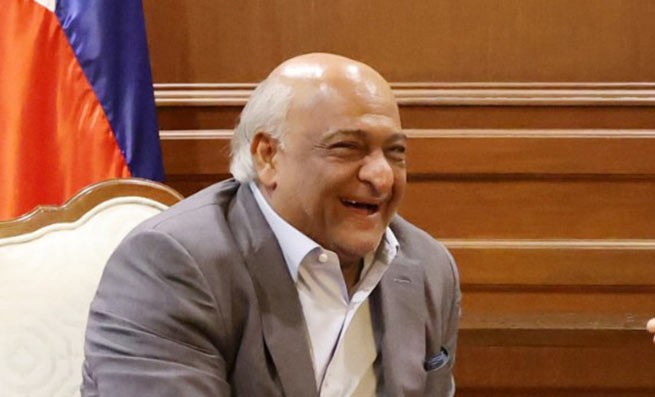It was he who helped the Russian state oil company Rosneft avoid sanctions and price restrictions from the G7, and continue to do business in many countries around the world.
According to Bloomberg, he was even one of the guests of the head of Rosneft, Igor Sechin, at a holiday organized by the latter on New Year’s Eve on a yacht anchored off the Palm Jumeirah, an artificial island in Dubai, on the beaches of which the villas of many oligarchs are located.
We are talking about oil trader Murtaza Lakhani
Lakhani, who was born in Karachi, Pakistan and has been involved in crude oil deals for decades, helped Sechin create a network of oil traders and shipping companies to ship Russian oil around the world, “opening up” new markets for Moscow after Western sanctions were imposed.
https://rua.gr/news/european-news/51680-strany-g7-dogovorilis-ustanovit-fiksirovannyj-potolok-tsen-na-rossijskuyu-neft.html
While Lakhani’s main trading company, Mercantile & Maritime Group, has done deals with Rosneft in the past, the network formed after the war in Ukraine is based on newly created companies, many of them in the United Arab Emirates, according to Bloomberg.
The companies, which became among the largest traders of Russian oil last year, bought tens of millions of barrels of crude oil from the country, loaded it onto ships and sold it to customers in India and China. This helped Moscow minimize the impact of sanctions and brought huge profits both to Rosneft, which pays billions in dividends to the Kremlin, and to Lakhani himself.
https://rua.gr/news/european-news/52241-es-dostig-soglasheniya-o-potolke-tsen-na-rossijskuyu-neft-v-usd60-za-barrel.html
Who’s who in Lakhani’s company
After leaving Pakistan, where he was born in 1962, Lakhani grew up in England and Canada and managed to catapult himself into the upper echelons of the commodity trading world thanks to a risky gamble he took decades ago.
After the first Gulf War he appointed himself “Glencore’s man” [швейцарская транснациональная компания по торговле сырьевыми товарами и добыче полезных ископаемых, расположенная в Бааре, Швейцария] in Baghdad.” At the time, Iraq could only sell its crude oil through a scheme known as the Oil-for-Food program, which was administered by the United Nations. However, Saddam Hussein managed to circumvent these restrictions, as was later revealed by a UN investigation According to the organization’s report, Lakhani’s role was to transport bags of cash for a trading company, leaving them at the Iraqi diplomatic mission in Geneva.
During the course of the investigation, he came into contact with a number of officials in Washington. In this way, he was able to create a network that allowed him, in particular, to place top managers of the time on the boards of his companies, such as Simon Murray, the former chairman of Glencore, and Charles Guthrie, who was the most senior general in the British army. Lakhani also became a major donor to Britain’s Conservative Party, election commission records show.
Then, shortly after Sechin’s appointment as Rosneft CEO in 2012, the Russian oil company’s boss contacted Lakhani.
https://rua.gr/news/european-news/52710-kak-rossiya-planiruet-preodolet-potolok-tsen-na-neft-navyazannyj-zapadom.html
Relations between Lakhani and Sechin
A former Soviet translator and intelligence agent, Sechin served as Putin’s chief of staff in the St. Petersburg mayor’s office in the 1990s before being promoted to deputy prime minister. The Russian official formed a close relationship with Lakhani after the trader helped Rosneft enter the Iraqi market and was soon advising the company on a range of issues. Lakhani’s word began to carry such weight that Rosneft employees regularly preferred to turn to him for advice.
Over time, Lakhani’s relationship with Russia only deepened. In 2020, his own company announced itself as the largest carrier of petroleum products for the Russian state oil giant. While his business in Russia flourished in the years leading up to the invasion of Ukraine, Lakhani also improved his contacts in Washington and London.
After trips to sanctioned countries such as Venezuela, he routinely briefed U.S. and British officials on his conversations, six people familiar with the matter said. As a result, Lakhani remained confident that he could extract significant profits from his operations in these regions while avoiding sanctions.
Lakhani’s lobbying role has become even more important this year, Bloomberg sources said, as White House and U.S. Treasury officials in private meetings urged trade heavyweights to keep Russian oil flowing in an attempt to prevent a supply shock that could send pump prices higher.
Lakhani’s network of companies trading Russian oil is centered in the United Arab Emirates, with one of them directly linked to Rosneft, according to people familiar with the matter.
https://rua.gr/news/european-news/52214-liberation-grecheskim-sudovladeltsam-plevat-na-sanktsii-protiv-rossijskoj-nefti.html
Washington’s reaction
How is Washington reacting to revelations about the complex network through which Moscow continues to export oil to many corners of the globe, despite Western sanctions?
According to Bloomberg, Biden officials say they are confident that the price cap was largely successful: market stability was maintained while oil revenues were slashed and returned to Moscow. But now, they say, there is an opportunity to tighten the noose around some traders who bend the rules.
But Lakhani’s ongoing relationship with Sechin, who has been subject to sanctions since 2014, has raised concerns among some officials, who are pushing for a maximum pressure strategy from Washington, London and Brussels.
Meanwhile, the recent oil rally has created a conundrum for both policymakers and middlemen involved in Russian trade. With most of Russia’s Urals crude trading above the $60 cap, the question is how aggressively Washington can crack down on non-compliance with the cap and Western sanctions, especially at a time when tensions in the Middle East threaten to drive up oil prices.
In fact, Lakhani himself sees these upheavals as an opportunity to promote Russian oil trade and become one of the leaders in the industry.







More Stories
Modern Germans are far from the most hardworking in Europe
Georgia: Opposition leaders were brutally beaten by security forces (video)
Congressmen warn ICC about sanctions because of Netanyahu